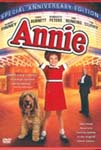

ANNIE
The original comic by appears as a full page strip by Harold Grey Aug. 5 1924. Later it became a half page. James Whitcomb Riley's 1985 poem Little Orphant Annie
A film version based on the poem appeared in 1918. 1931 saw the appearance of a radio version. A version based on the strip appeared in 1932, and another in 1938. In 1977 the Broadway show appeared and in 1982 the film version of the Broadway show. In 1986 the Russians made an animated version.
In this film there is a "double transformation". The comic => a musical play and then => a film.
MUSICALS
Musicals have music in non performance situations. Generally defies American striving for realism. One question becomes the transition from spoken dialog to sung. The last three big musicals have been "sung through" (Evita, Moulin Rouge and Phantom of the Opera).
Difficult problem in deciding is singing diagetic or not. Do people in the film hear singing???
Music: What is its function?
How do the authors get "in and out" of musical numbers?
Differences between solos, duets, trios and ensemble pieces.
FAMOUS LINE: Leapin' Lizards
Watch for meaning of names. AFTER THE FILM
Does the film indicate its comic book origins?
Less than the last three films.
Some of the color seems a bit artificial.
The fact that it is a musical may divorce it a bit from reality and so link it back to the comic.
If comics, by virtue of their being drawn rather than photographed, are different from films, then how does one maintain the comic strip/book atmosphere - i.e. lack of reality of violence etc.?
TEXT AND SUBTEXT
Conservative cartoon:
Annie: Born on leap year (Hence leapin' lizards") and so ages one year for four. Despite this Annie belongs to those characters in comics who despite their long lived lives in the papers they never age.
Daddy Oliver Warbucks. Extremely wealthy (where does money come from? Unknown but name implies from War profits.. Republican. Defender of "The American Way".
Punjab: 8 foot Man from India
Asp: Chinese
Political message: Government is full of red tape Grey hated, loathed and despised FDR and his policies and he never had FDR and Roosevelt meet as happens in the play (or worse) accept his policies.
Enemies changed over time: New Deal; 5th columnists; Communist Menace; and later, long haired hippies and intellectuals. Some claim her to be the Joan of Arc for the American right.
Strip held the good society was created by competing individuals in a laissez- faire atmosphere.
It is basically a social Darwinist strip in which those of the top are most fit. Success is an indication of merit.
(Consider lines like “Why would anyone want to be an orphan” status is under one’s control)
In some ways the film conflicts with other structural elements of the film. By the time of the play the country had moved much further left and the message of the film was less acceptable.
Entrance in and out of the musical numbers
Ensemble vs. Individual Numbers.